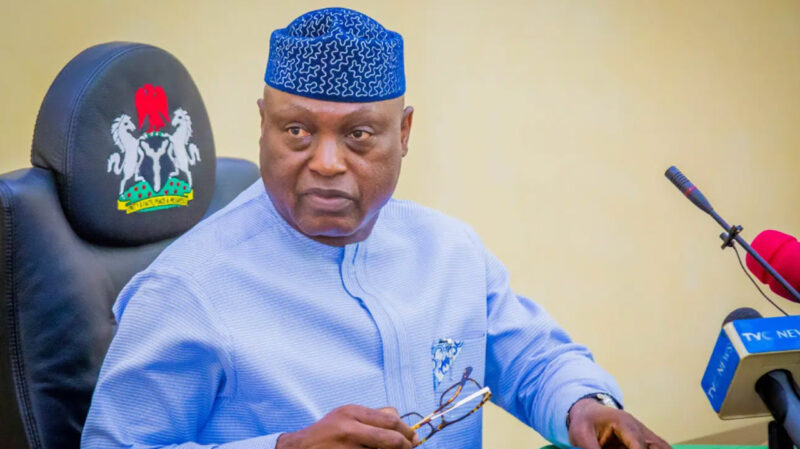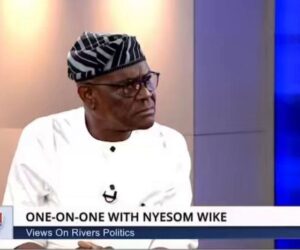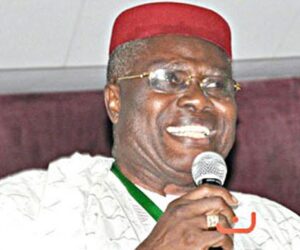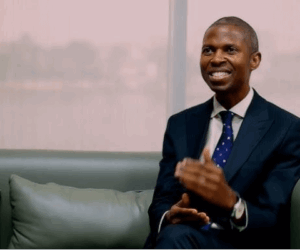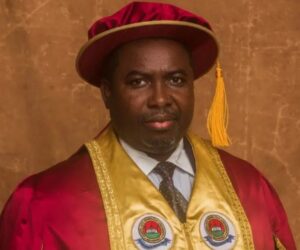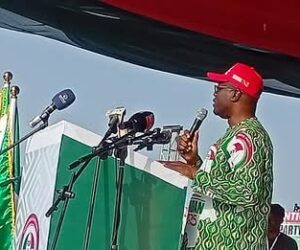Last Wednesday, the usually sedate national secretariat of the All Progressives Congress (APC) in Abuja turned into what many described as an Owanbe-style carnival.
Drummers beat frantically, women in various uniforms to symbolize their groups, all with APC print gele, danced in synchrony, and banners bearing the portrait of Governor Biodun Oyebanji, lined the premises.
Governor Biodun Oyebanji of Ekiti State arrived to submit his nomination forms ahead of the October 27 governorship primary, flanked by a formidable entourage of party leaders, traditional politicians, and grassroots mobilisers.
The spectacle was deliberate, a calculated statement that Oyebanji is not only the frontrunner but also the consensus candidate of Ekiti’s political elite.
At his side were Senate Leader Opeyemi Bamidele, former governor and minister of Industry, Trade and Investment, Niyi Adebayo, and some protégés of Ayodele Fayose .
All 26 members of the Ekiti State House of Assembly, local government chairmen, and National Assembly members from the state were also present.
In an unusual sight, even former Senator Biodun Olujimi, a long-time stalwart of the opposition People’s Democratic Party (PDP), was spotted mingling around the show of force.
For Oyebanji, the message was clear.
He wanted the national leadership of the APC to see him as not only the continuity candidate but also the man destined to “break the jinx” of Ekiti’s revolving-door governorships.
“Since creation, no governor of Ekiti has served two terms in one stretch,” he said.
“They go, they come back, and this has retarded our development as a people. We see it as a jinx that must be broken.
“We want to build on current gains and not allow them to be reversed. By God’s grace, I have a divine mandate to break that jinx,” he said.
He coupled this with an appeal for party discipline.
“We will subject ourselves to the primaries, we will play by the rules, and we have no fear,” he declared.
“But APC must also not present a weak candidate ahead of 2027. The 2026 governorship election in Ekiti is a stepping stone to the general election.”
Supporters chorused their approval with songs such as “Eko ti te” and “A traitor must not be forgiven.”
The chants were aimed at one man: Kayode Ojo, popularly known as Eko, and unarguably, Oyebanji’s leading rival in the race, who is widely believed to be backed by a key ally of President Bola Tinubu currently serving in the cabinet.
In the Oyebanji camp, Ojo is portrayed as a political outsider whose roots are more in Lagos than in Ado-Ekiti.
“We cannot afford to let someone from Lagos come and govern Ekiti,” one chieftain said pointedly.
This “Lagos outsider” narrative has become Oyebanji’s strongest selling point among the Ekiti elite, helping him unite figures who were previously at odds, including Fayemi and Bamidele.
It also explains why Oyebanji’s Abuja declaration carried so much theatre. His team wanted to dramatise unity, a show of Ekiti against Lagos, of homegrown loyalty against alleged importation.
But Kayode Ojo has not taken this lying down.
After submitting his own forms the next day, the businessman and educationist launched a broadside at both the governor and the national secretariat.
He accused the APC National Secretary, Senator Ajibola Basiru, of bias after Basiru was quoted as saying there was “no vacancy” in the Ekiti Government House. “That statement was reckless,” Ojo said.
“It is the duty of the national secretariat to provide a level playing field. Instead, we are seeing a process skewed in favour of the governor.
“I can tell you categorically that if we field this current governor as our candidate in Ekiti, the 2027 presidential election will end up in a terrible disaster for President Tinubu. Ekiti will give President Tinubu election koboko. We cannot afford to take chances.”
Ojo also accused Oyebanji of hobnobbing with the opposition.
“Look at Senator Biodun Olujimi sitting at his side in Abuja,” he told journalists. “What clearer sign do you need that he is running with PDP elements while calling himself APC?”
Abimbola Olawunmi, the only female aspirant in the race, went further by deploying numbers.
“Since the president was inaugurated in 2023, the allocation coming to my state tripled. By the end of June 2025, when we analysed what had come in, we discovered that the Oyebanji administration had received over ₦500 billion in three years.
“But when you come to Ekiti State, you hardly find anything that reflects that,” she said.
On agriculture, she alleged waste of earmarked funds: “₦50 billion was given to Ekiti last year for food security. By now, Ekiti should be feeding the whole of the Southwest. But as it is today, we don’t even have a tuber of yam the government can boast it produced from a farm in Ekiti.”
She added a personal claim of intimidation: “About three weeks ago, the governor petitioned me to the DSS. I went there with certified copies of all the money he had received from the federal government.
“By the time I presented them, they saw it was the truth and let me go. That is not democracy. That is fear of accountability.”
For Olawunmi, the deeper problem is the continuity of a cabal. “The men have been in power for 26 years, and the story is the same. They weaponise poverty. It is time for a woman to bring the desired change.”
Read also: Let me break Ekiti’s eight-year jinx, Oyebanji tells APC
If there was one subplot at the heart of Abuja’s theatrics, it was the reconciliation of old rivals.
For months, Oyebanji had sought to cement ties with Senate Leader Opeyemi Bamidele, another close ally of the President who initially showed interest in contesting. His efforts were often complicated by tensions with former governor Kayode Fayemi.
But last Friday’s Ekiti stakeholders’ meeting produced a surprising tableau: Bamidele and Fayemi sitting together publicly, with Fayemi openly throwing his weight behind Oyebanji.
“I remain APC, I have no reason to leave,” Fayemi said, silencing rumours of estrangement.
He also praised Oyebanji’s inclusiveness though he stated that he doesn’t agree with that style of politics.
That image — of a once-divided elite now rallying together — was the crown jewel of Oyebanji’s Abuja show.
It explained why his supporters framed the race as not just about governance, but about defending Ekiti from external influence.
Ekiti’s tortured governorship history adds weight to Oyebanji’s argument.
Since its creation in 1996, the state has never had a governor serve eight consecutive years.
Niyi Adebayo lost his second-term bid in 2003; Ayodele Fayose was impeached in 2006, though he returned in 2014 for a non-consecutive term; Segun Oni was removed by court order in 2010; and Kayode Fayemi lost re-election in 2014 before returning for another single term in 2018.
Oyebanji’s pitch to voters is that stability has eluded Ekiti for decades, and his re-election would finally break the cycle. His rivals counter that what Ekiti needs is not continuity, but a fresh start.
The Abuja declaration was both spectacle and strategy.
By gathering Ekiti’s most recognisable faces, Oyebanji sought to show he has the elite sewn up, that he is the homegrown candidate who can carry Tinubu’s 2027 project.
But the cracks were visible: Ojo’s “koboko” warning, Olawunmi’s figures of alleged mismanagement, and murmurs of anti-party activities tied to his closeness with PDP figures.
For now, Oyebanji controls the optics. Whether he controls the votes when the APC primary comes on October 27 is another matter.
Ekiti’s history suggests that carnivals at the secretariat are only the beginning; the real test is whether unity on stage can survive the fractures backstage.

